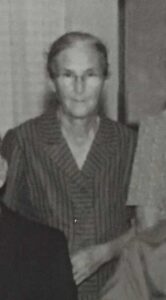Aunt Effie

As soon as I spotted the bag of soft peppermint in the candy aisle, cherished childhood memories of my Aunt Effie came to mind. There were two things you could count on when visiting Aunt Effie. The candy jar was filled with soft peppermint pieces and lemon drops. And you would always find a small bowl filled with leftover ham and a cold biscuit sitting on the back of the stove.
My daddy’s sister, Effie Thrift, was a formidable and independent woman despite her petite stature. She was practical and hardworking, with a heart filled with compassion. Without a doubt, she was treasured and respected by all fortunate enough to know her.
One of my earliest childhood memories was standing on the front porch with Aunt Effie and Uncle Bill, waving goodbye to my family as they prepared to return home after a Sunday evening visit. Crying, as Daddy finally placed me in the car, Uncle Bill reassured me I would come back another time.
And I did, time after time, for the next 30 years.
After Uncle Bill passed away in 1958, Aunt Effie continued to run their farm independently for many years. It was not unusual for us to make a weekly visit.
“We need to check on Effie,” my dad would say. Then, the entire family would load up in our ’57 Chevrolet and make the 20-minute drive to Riverside in neighboring Brantley County.
Swatting yellow flies in the summertime, we would stand in the shade beneath the grapevine tasting the sweet, ripe grapes while filling a large brown grocery sack so Mama could make grape jelly the next day.
As we made our way back to the house, Mama would protest, “Effie, you don’t need to fix anything for us- we have plenty at home.” But it wasn’t long before we were all crowded together on the wooden benches around the table in her small dining room.
The summer months in Riverside brought the challenge of ‘getting the tobacco crop in.’ Harvesting tobacco was an exciting time for my sister, Phyllis, who worked as a “hander.” At 16, she was the only one allowed to work in tobacco.
Her job was to pull three leaves from the tobacco sled, hold them with the stems together, and hand them off to the stringer. Her slim, youthful fingers, covered with the black gum, did not deter her enthusiasm for having a summer job.
While she enjoyed her time with Aunt Effie, her social life soared during the summer. Many of the neighboring young teens would assist with the picking, stringing, and finally hanging the sticks of strung tobacco in the barn rafters for curing. The laughter, the busyness, the camaraderie, and the unmistakable smell of aging tobacco filled those hot summer days.
Younger children were allowed to watch the process from a distance but soon became bored and looked for more exciting ways to spend their time. We would hang over the fence top as we watched the new little pigs walk on unsteady legs. Little did we know of the horrific danger if we should accidentally fall into the pen with that mama sow. Counting eggs through the wire mesh of the chicken coop was always a challenge, as were games of hide and seek or chase. Eventually, we filled our time with complaints of total boredom while the diligent tobacco workers labored in the fields.
A large dinner was prepared and served each day at noon. Aunt Effie worked in the field during the morning. But at dinnertime, she was in the kitchen along with the women preparing vast quantities of food. One helping of any dish was never enough.
Dropping temperatures signaled the arrival of winter and the necessary chore of butchering hogs, which was not for the faint of heart. We would arrive during the early morning seeing nature at her finest hour as the sun sparkled on dewdrops like faceted jewels. The sky would be pitch dark when we returned home. The stars, too, looked like diamonds against the dark, uninterrupted sky.
After the slaughtered hogs were cleaned, salted, and hung in the smokehouse for curing, cooking the pork cracklings was well underway. (Using the Southern pronunciation, we drop the g off the ‘ing’ and refer to them as cracklins.)
The tin-roofed shed sat just outside the old wooden frame house. The outbuilding was barely large enough to hold the cast iron boiler and the surrounding brick siding, which housed the roaring fire necessary for cooking.
The boiler was filled to the brim with the pork cracklings. A ladle, affixed to a long splinter-free wooden pole, was used to stir the cracklins as they cooked and later remove them from the vat when done. The adults consumed a fair amount of the crispy and crunchy pork skins throughout the evening.
The nighttime air was bitterly cold as children played outside in the dark. It was comforting to take a brief reprieve from the cold by easing our way into the warm but crowded shed.
“Don’t get too close to the fire,” the adults warned as they opened the metal door and added wood to the already blazing fire beneath the boiler.
Before long, we would dash back into the darkness, dimly illuminated with the single bulb hanging from the boiler shed rafter. The appealing combination of wood smoke and pork filled our senses as we breathed the chilly night air.
When the time came to grind sugar cane, we, along with other aunts, uncles, and cousins, again made our way to Riverside. We watched as the willing horse, harnessed to the grinder, made his repetitious, circular journey while long, rounded stalks of cane were hand-fed into the grinder. Bucket after bucket of sweet cane juice was poured into the boiler and cooked until it became a golden caramel color. The adults carefully poured the sweet syrup into washed and rewashed old whiskey bottles and placed them on a shelf for cooling. As the evening came to an end, Aunt Effie insisted that we take a bottle or two of the freshly prepared syrup, along with several jugs of raw cane juice.
The years passed quickly, too quickly. The old horse was replaced with a tractor. The fields were no longer laden with tobacco plants or stalks of cane. The large garden became relatively small. And the old hand pump, which sometimes needed priming, was replaced with a galvanized water spigot and green garden hose. The shed where all those delicious-smelling cracklings cooked sat empty and deserted. The quietness was deafening.
Later, as an adult with a child of my own, I often accompanied my mother, who would say,
“Let’s ride over to Effie’s for a while.”
As we arrived, she would step out onto the old wooden porch, as she had for the past 30 years, telling us to “come on in.”
On each visit, I walked through the familiar house into the kitchen. Sitting on the stovetop was a bowl filled with a slice of fried ham and a couple of cold biscuits. And the candy jar was filled with soft peppermint and lemon drops.
The old house is still standing, though the people who made it home have long since gone. Just today, I passed that way. My eyes followed the solitary dirt lane leading to the house, remembering another time and the people I loved.
